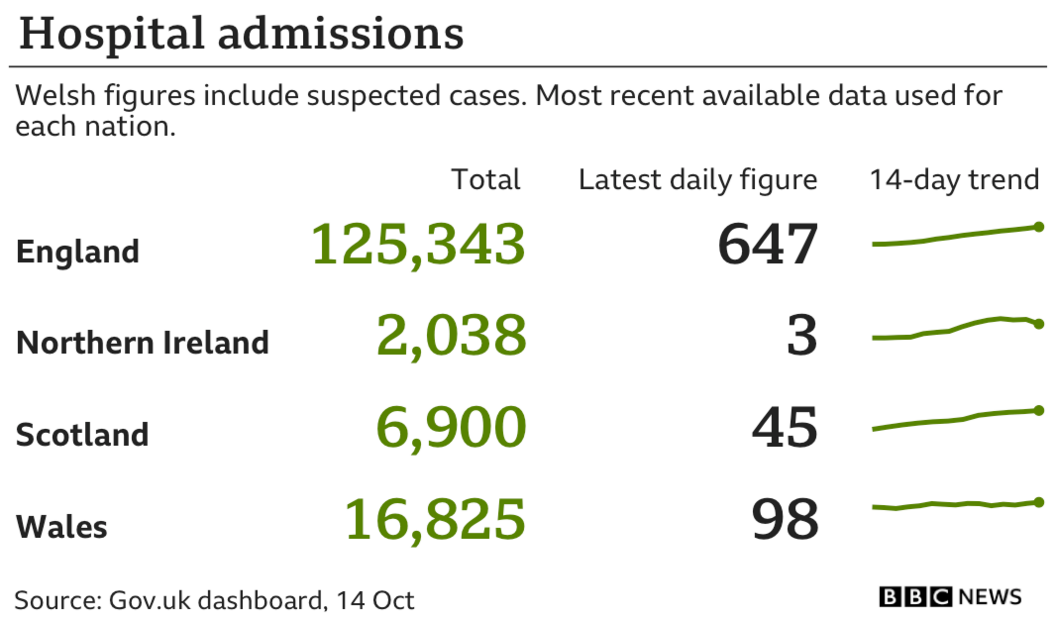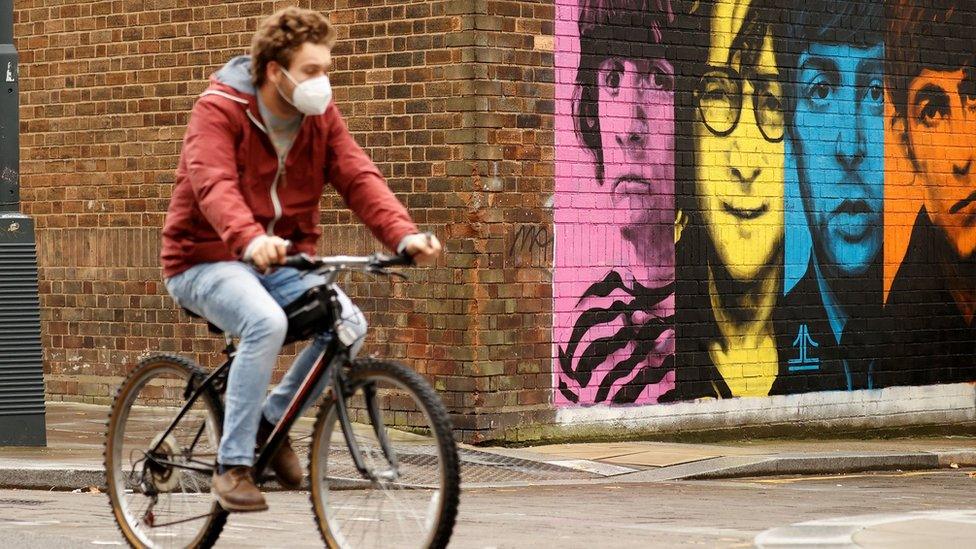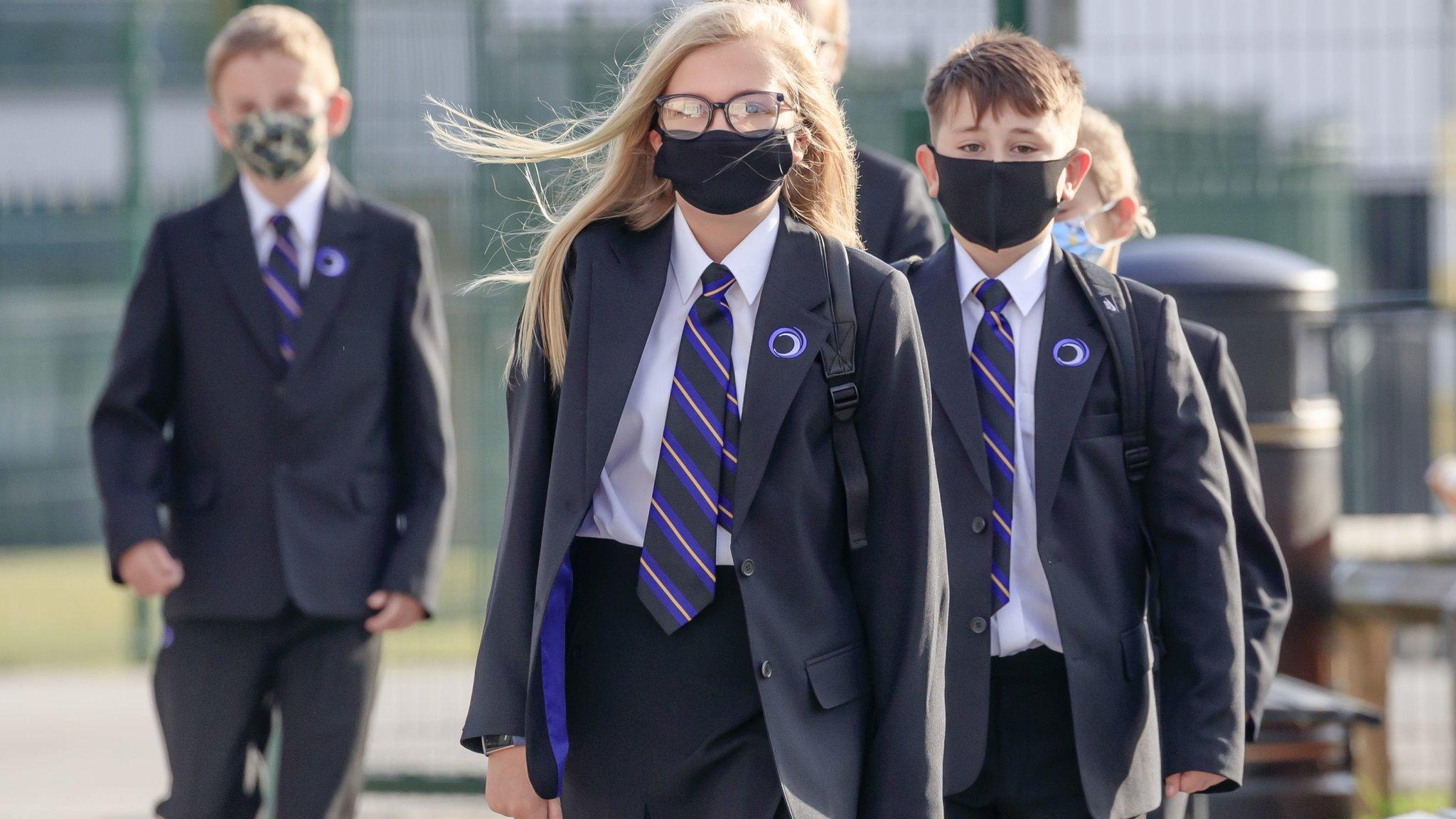Covid-19: Boris Johnson defends regional curbs but 'rules nothing out'
- Published
- comments
The prime minister and Labour leader clashed over coronavirus policy
A new three-tier system of regional Covid-19 restrictions in England "is the right way forward", Boris Johnson has said.
The PM told the House of Commons the policy "can bring down the virus" but that he did not rule out going further.
Labour leader Sir Keir Starmer again called for a "circuit-breaker" - a short, limited lockdown in England to bring the virus under control.
He said such a move was supported by government science advisers.
The PM said he hoped the three-tier system would "avoid the misery of a national lockdown".
He added: "I rule out nothing of course in combating the virus, but we are going to do it with the local, the regional approach that can drive down and will drive down the virus, if it is properly implemented."
It comes as Wales prepares to ban people from parts of the UK that have high rates of coronavirus from travelling to the country from 18:00 BST on Friday.
On Wednesday, a further 19,724 coronavirus cases were recorded in the UK, while 137 more people have died within 28 days of testing positive for the virus.
The new tier system has begun in England, with the Liverpool region the first to enter the highest alert level.
The BBC understands that a meeting of the Joint Biosecsurity Centre (JBC) has suggested that Greater Manchester alongside much of north-west and north-east England, large parts of Yorkshire and parts of the Midlands should also be moved into the highest tier.
The JBC recommendations will not necessarily be enforced and discussions are likely to continue between local and national politicians and officials over the coming days.
Greater Manchester's mayor Andy Burnham had a meeting with deputy chief medical officer, Prof Jonathan Van-Tam, and said further talks are to take place on Thursday morning with the "PM's team".
Most of the country is in the lowest tier - medium - but millions of people in the North and the Midlands are currently in the second highest tier and face extra curbs on households mixing.
Schools, close-contact services and all retail outlets will remain open under basic measures, even in the highest alert areas.


In other developments:
Schools in Northern Ireland will close from Monday and pubs and restaurants face new restrictions on Friday
Scotland's First Minister Nicola Sturgeon has advised Scots against travelling to high risk areas of England as she singled out Blackpool as "associated with a large and growing number of Covid cases in Scotland".
Passengers arriving in the UK from at-risk countries might be able to avoid having to quarantine as part of a number of options being considered by the government. Transport Secretary Grant Shapps told a travel conference the plan could involve private Covid testing or a period of self-isolation before departure
'Legal challenge'
Local politicians in Greater Manchester have argued against the region being put into the highest tier saying that without increased financial support they would prefer a circuit-breaker.
Mr Burnham said he would consider a legal challenge if the government placed the area in Tier 3 restrictions, adding such a move would be "by imposition, not consent".
But Bolton Council leader David Greenhalgh said he was not in support of a circuit-breaker at this time.
Steve Rotheram, mayor of the Liverpool City Region, said he and Mr Burnham were also considering legal action against the new job support scheme.
He said it appeared "discriminatory" that No 10 had offered to pay 80% of workers' pay in March under the furlough scheme while the latest help is providing two-thirds of wages to employees of businesses made to close under the restrictions.

Analysis
By political correspondent Leila Nathoo
The approach of targeting different restrictions at different parts of England has exposed a rift between Westminster and some local politicians, who have called for more say over what's happening in their areas.
Under pressure to say why he has so far rejected the idea of a national "circuit-break" period, Boris Johnson was keen to stress that the current package of measures could bring down transmission IF there was co-operation at a local level and proper enforcement.
More involvement for local leaders means more responsibility for things going well - or badly.
For now, the PM seems determined to continue to try to tread this middle path - mindful also perhaps of the chunk of his own MPs concerned about even the current range of restrictions and the impact on the economy.
The risk is that he may have lost valuable time, if he does decide to change course.

The Labour leader's initial call for a circuit-breaker in England came on Tuesday.
Sir Keir said such a course of action would help buy time to "save lives, fix testing, and save the NHS".
Schools would kept open as normal because it would be timed to coincide with the October half term. However, Sir Keir said "all pubs, bars and restaurants would be closed" and compensated.
Speaking at Prime Minister's Questions, he said Mr Johnson had rejected the advice of government science advisers, who had suggested a circuit-breaker when they met on 21 September.
Separately, a scientific report has suggested a two-week circuit-breaker at the end of this month may halve coronavirus deaths between now and the end of the year. The researchers said the measure "buys more time to put other controls in place", but there is huge uncertainty over some of their predictions.

SOCIAL DISTANCING: How have rules on meeting friends changed?
FACE MASKS: When do I need to wear one?
TESTING: How do I get a virus test?

But, responding to Sir Keir's comments, the PM told MPs the three-tier system was an "opportunity to keep things going, to keep our kids in schools, to keep our businesses going" and the "logical thing to do".
"That, I think, is what the people of this country want to do. This is our opportunity to do that and suppress the virus where it is surging," he said.
The PM said the disease was now "appearing much more strongly" in some parts of the country than others so a different approach was needed to that taken earlier in the year.
He highlighted the fact there were 670 coronavirus cases per 100,000 residents in the Liverpool region, compared with 33 per 100,000 in Cornwall.





YOU, ME AND THE BIG C: About Cancer Treatment and Covid-19
LONG COVID: What's the science behind the long term symptoms?

- Published14 October 2020

- Published14 October 2020
